The SeaKeepers DISCOVERY Yacht Program is our foremost initiative for accomplishing our mission and goals. DISCOVERY Yachts are privately owned vessels which facilitate programming by providing access to the ocean for research, scientific discovery, community outreach and artistic inspiration.
These yacht owners are dedicated to supporting ocean conservation, and many are themselves managing their environmental impact through conscious decisions of how they operate their vessels. Here we share how these Eco-Champions lead by example and put into practice what they strongly believe is needed to protect our oceans.
If you are taking strides in reducing energy, plastic, fuel, or carbon emissions in any way and would like to share your efforts, please contact [email protected] and let us know what you’re doing to protect our oceans!
DISCOVERY Yacht Champions

CIFT Sunboat II
ICAR CIFT, Matsyafed Fish Farm Captain
DISCOVERY Yacht CIFT Sunboat II is a 27’ motor yacht built by Samudra Shipyard in 2019 for use at Matsyafed Fish Farm in Kerala, India. D/Y CIFT Sunboat II is powered entirely by solar power, replacing the use of fossil fuels. By eliminating the use of fossil fuels, the vessel minimizes its CO2 emissions and contributions to climate change to address the contributions of India’s maritime sector to the country’s carbon footprint. By opting for solar power propulsion, D/Y CIFT Sunboat II eliminates the cost of fuel for fishermen, a rising cost that has hurt the fishing industry. The absence of the burning of fossil fuels also makes the vessel very quiet, reducing the impacts of sound pollution on marine organisms.
- No fuel cost
- No CO2 emissions
- No sound pollution
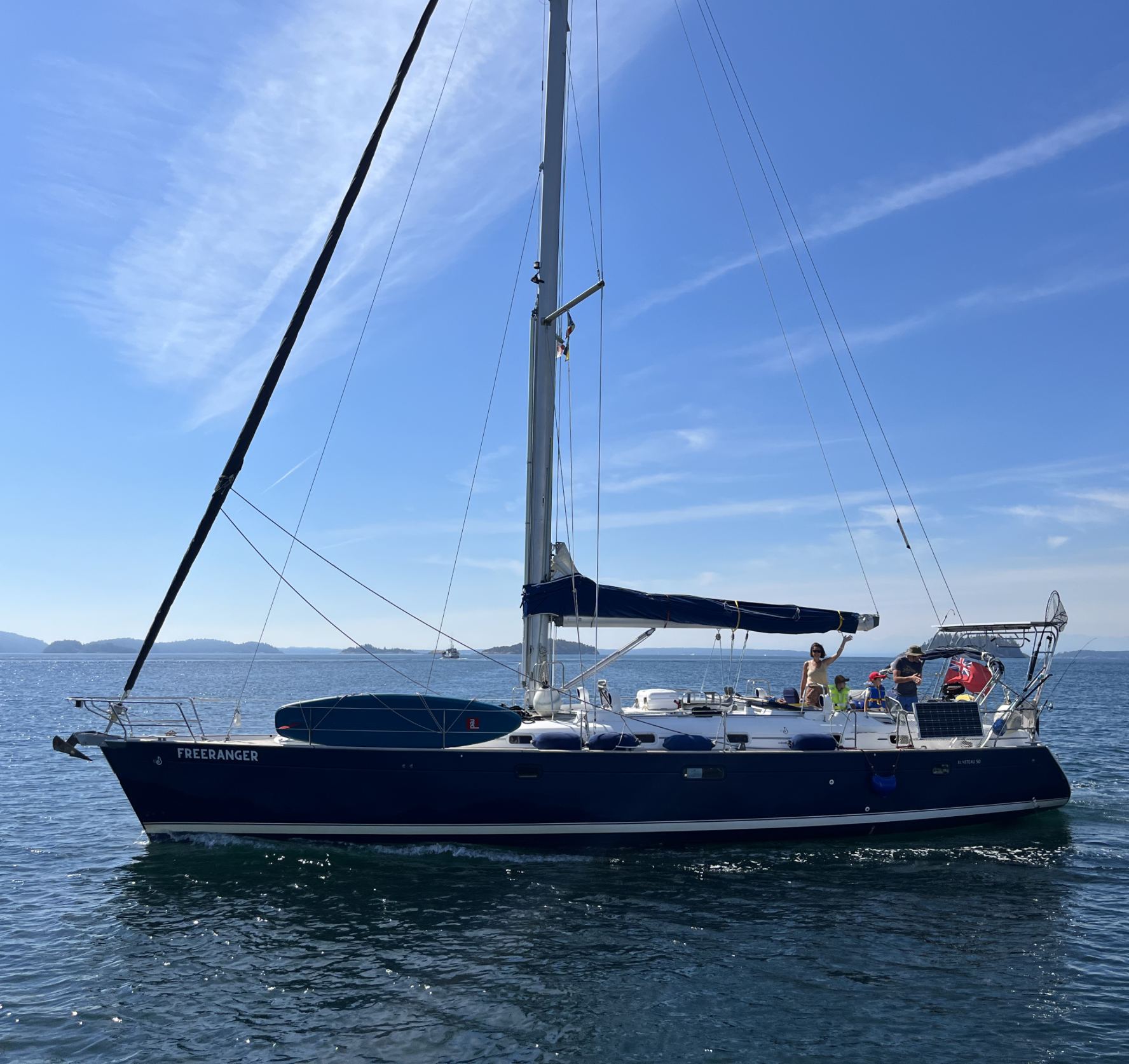
Freeranger
Duncan Copeland and Larissa Clark
DISCOVERY Yacht Freeranger is a 49’ sailboat built by Beneteau in 2005 and refit in 2019. Captained by Duncan Copeland, D/Y Freeranger is their family’s home, aimed at educating their children through adventure sailing and inspiring ocean protection. Originally purchased secondhand, Freeranger is committed to minimizing its environmental impact; equipped with 6 solar panels generating 645 watts, the crew emphasizes efficiency and reducing engine use. They optimize sail usage by coordinating with tides and winds, using eco-friendly practices onboard like local food sourcing, reduced meat consumption, and minimizing single-use plastics. Copeland and Clark, with extensive experience in environmental campaigns and marine conservation, engage in citizen science and marine debris cleanups, fostering connections through their Citizen Science Directory at www.freerangeocean.org.
- Rocna anchor minimizes damage to the seabed by setting quickly and causing minimal drag
- Repurpose and recycle batteries, engine oil, and other equipment
- Reduce water maker usage by rinsing, steaming, and soaking with salt water
- Prioritizes marinas that are eco-certified.
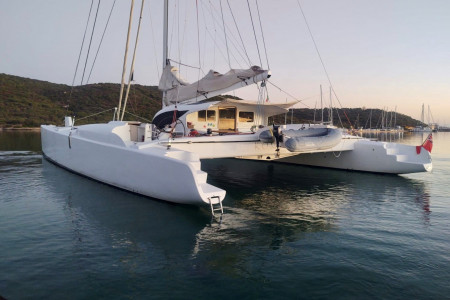
Komotion
Mike Kopman
Komotion is a 72’ Catamaran that was custom-made in 2008 and refit in 2020. She is owned by Komotion Expeditions Ltd. and captained by Mike Kopman. Residing in the North Hemisphere, she spends the summers in the Mediterranean and winters in the Caribbean. Komotion is mostly powered by sail but is equipped with two 80 hp inboard diesel engines. The crew does their best to sail as much as possible and avoid the use of the engines to minimize their carbon footprint. They also practice sustainability by making lifestyle changes such as using eco-friendly cleaning products, and they endeavor to make their own whenever possible. The crew also limits their role in the marine debris crisis by avoiding single-use plastics such as bottled water.
- Environmentally friendly cleaning products
- Avoid usage of single-use plastic
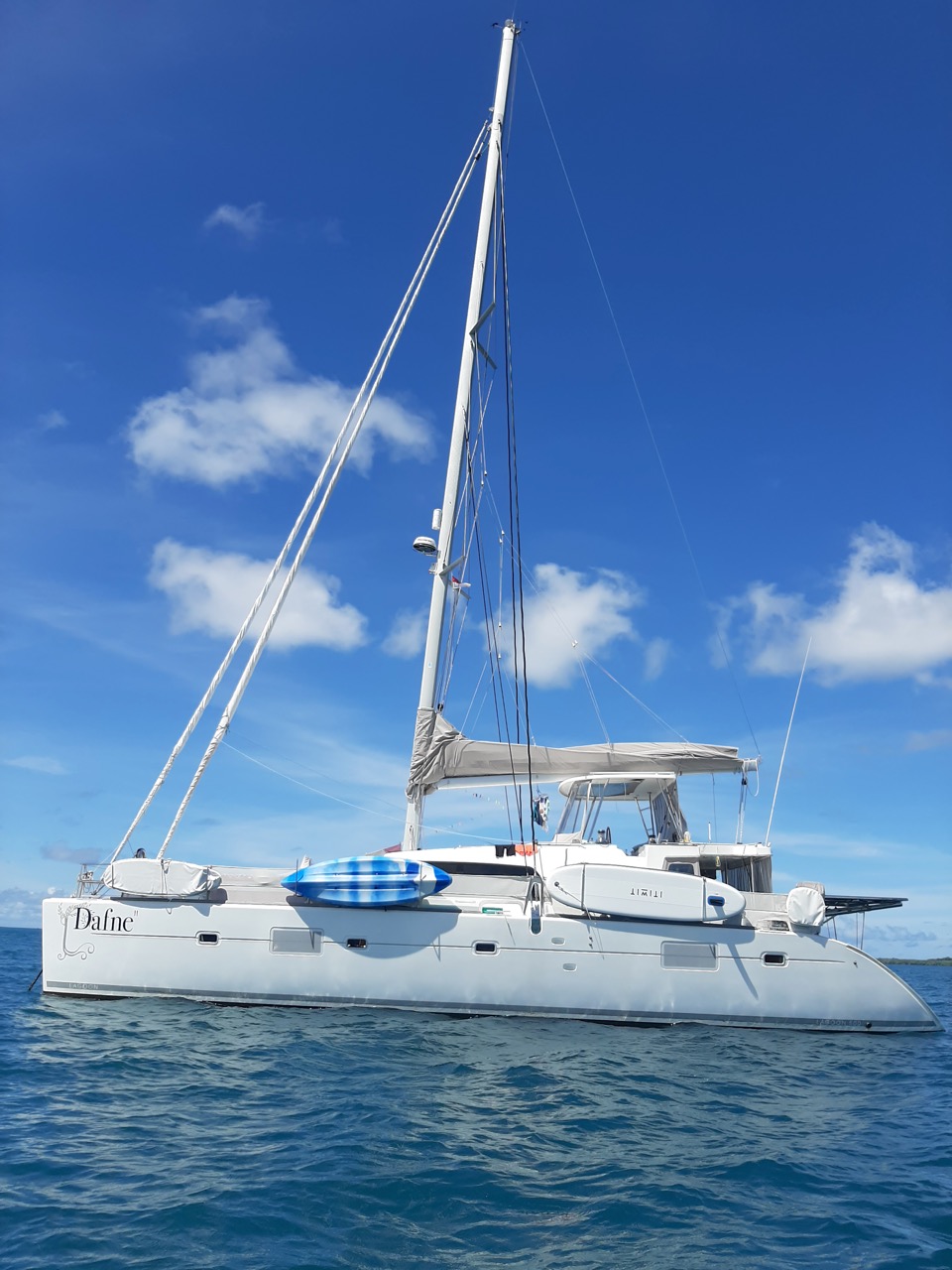
Dafne II
Paul Bennett & Lani Bevacqua
According to Owner, Paul Bennett: "Living on a boat has many advantages, one of which is that you live very close to the natural world—literally, in it. So, you become very sensitive to your footprint, whether it's the amount of garbage you produce or the liters of diesel that you burn. Also, as you voyage the world, you often observe the negative impact that humans have on our environment, most often in the form of plastic floating in the water or covering a beach." As a result of this, Dafne II decided to make their boat greener in a number of ways. Firstly, they added 2.1 kilowatts of solar power and lithium batteries in order to avoid burning diesel while at anchor in tropical environments. Secondly, they have a watermaker on board that operates from battery power; and as long as they conserve water they are able to mostly live without requiring fossil fuels for stretches of time. Lastly, on top of this they have a robust waste management system where organics get thrown overboard in deep water, and plastics, metals, and glass are reserved for on-shore recycling where possible.
- 2.1 kilowatts of solar power and lithium batteries
- Watermaker on board that operates from battery power
- Robust waste management system
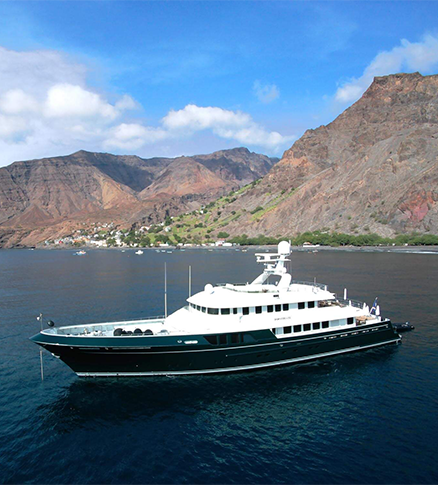
Dorothea III
Captain John Crupi
Dorothea III was built for modern, efficient, green cruising. Her single engine design provides excellent fuel economy saving between 30-50% compared to a similar twin engine yacht. Several years ago, the crew installed Spot Zero filtration systems and switched from buying cases and cases of single use plastic water bottles to utilizing reusable/refillable bottles on board for crew and guest alike. When provisioning, the crew always uses reusable shopping bags rather than paper or plastic options. In addition, they believe in reuse/recycle and the crew has done numerous initiatives involving collecting clothing and household items to donate around the world.
- Single engine design that saves between 30-50% compared to a twin engine
- Spot Zero filtration systems
- Reusable/refillable bottles on board
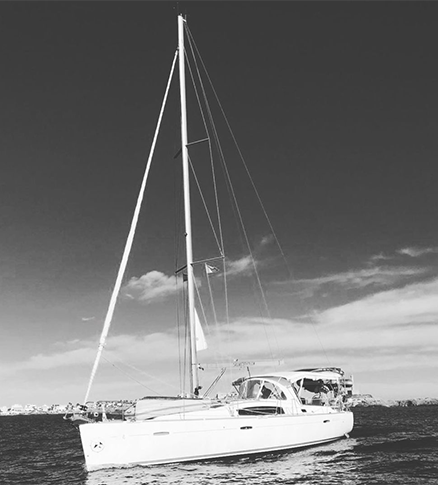
Zephyr II
James Langridge & Natalie Freire Hunt
Sailboat Zephyr is very self-sufficient, featuring eco-conscious systems and products on board. The vessel holds 2 x 250 watt solar panels which gives sufficient energy during the day and night to run all electronics on board that include: navigation lights, chart plotter, fridge unit, inverter and water pumps. Another incredible feature is the spectra water maker that makes up to 25 liters an hour through reverse osmosis. It runs completely off the solar panels so there's no need for an engine or generator.
James and Natalie avoid single-use plastics and prefer biodegradable materials. They have come up with some very easy and economic solutions/substitutes:
- Bamboo products: plates, cups, mugs & storage containers that do not break on a moving boat & are biodegradable if they do happen to fall in. Another bamboo alternative used scrubs for dishes, which last a lifetime and actually cleans better than your day to day sponges.
- Silicone & bees wax covers: these are great for boaters - takes up less space than aluminium or cling wrap and are reusable, easy to clean and much more convenient.
- Cork: used as cup holders and place mats - which are biodegradable and non-slip (extremely important when heeling).
- Bathroom essentials: toothbrushes, shampoo & conditioner bars, natural body soaps, - all free of packaging and completely reef safe. They don’t contain any parabens or sulphates. James & Natalie also make their own natural deodorants with bicarbonate and coconut.
- Cleaning product essentials: James & Natalie created a vinagre and bicarbonate mixture for toilets, mold, and mildew. All clothes is hand washed with essential oils and grating natural soaps.
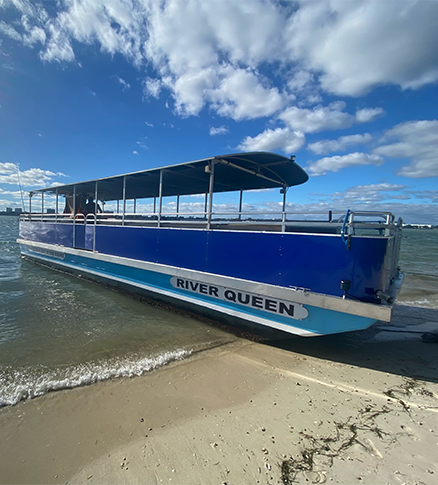
River Queen
JD and Shamsha Rodriguez
River Queen is a taxi-style boat owned by Watersports Association that operates on Biscayne Bay. As one of our DISCOVERY Vessels, Captains Shamsha and JD often partner with SeaKeepers to host our floating classrooms, where we teach the next generation of scientists and ocean conservationists. Many of these floating classrooms include island cleanups at the small but highly polluted islands in Biscayne Bay. Watersports Association is now utilizing River Queen to host their own cleanups more frequently and are making a drastic difference in the health and preservation of one of Southern Florida’s most important and at-risk ecosystems. On board River Queen, you’ll find Shamsha and JD handing guests reusable water bottles and encouraging participants to stay away from single-use plastics. They have been learning and sharing their knowledge throughout the company by providing their employees with 5-gallon reusable water jugs and encouraging other companies on the water to do the same. They have already encouraged 10 companies to switch to reusable alternatives, and we are excited to see how far their impact reaches.
- Reusable/refillable bottles on board.
- Host island cleanups to improve ecosystem health.
- Encourage other organizations and boats to avoid single-use plastics.
- Host floating classrooms to educate others about marine conservation.
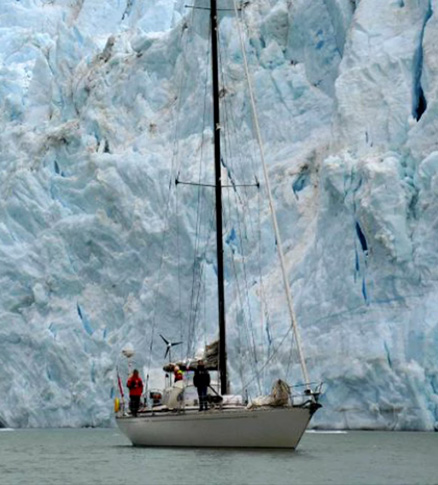
Venus
ArcticStern, Captain Axel Galpy-Massé
Venus is a Baltic 51’ that sails for the non-profit ArcticStern, founded in Quebec in 2019 by a group of adventurers driven by their passion for sailing and love for nature. They work towards exploring the link between humans and nature, limiting their ecological footprint, raising awareness of ocean issues, and participating in scientific and environmental projects. Along Venus’ navigation route, they frequently meet with local organizations to learn more about different environmental projects, to communicate and inspire people to engage in eco-friendly behaviors, and to promote sensitivity to the environment. They also lead workshops centered around teaching schools about the ocean’s importance and the issues it faces. According to Captain Axel Galpy-Massé, living on a sailboat is a different way of life - the fewer resources used, the better. Consequently, they are careful to limit their resources and diligent about sustaining themselves on their own energy. They do their best to minimize waste and buy food without plastic packaging as often as possible. Venus is also a DISCOVERY Yacht and has participated in a SeaKeepers Citizen Science project.
- Waste collection, painting, and education games to engage students in schools and share knowledge with the younger generation
- Leading beach and dive cleanups to collect trash
- Participating in various scientific research projects
- 4 solar panels
- Wind generator
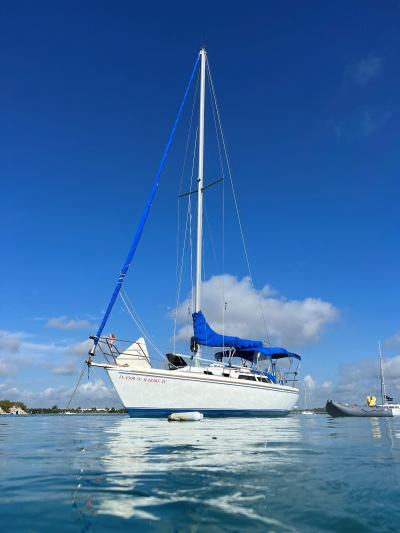
Rajore IV
Phillip Miller
Rajore IV is a 30’ Catalina who has been operating for about a year now with owner Phillip Miller. So far, it has been such an adventure for him. Living on the water, “has brought me closer to the ocean more than I could have imagined,” and in his time spent in the environment, Rajore IV gave Miller the desire to protect the fragile ecosystem he and Rajore IV call home. According to Miller, it was from this that the Fort Pierce Inlet Restoration Project was born, hoping to restore seagrass populations, clean up plastic, and protect marine habitats. From Rajore IV, Miller cleans up the plastic he sees floating in the inlet and scrapes algae from threatened seagrass beds. Through the Fort Pierce Inlet Restoration Project, Miller aims to leverage public support to protect certain areas and start hosting beach and water cleanups regularly.
- Retrofitted with an e-propulsion pod drive system that derives its power directly from renewable energy
- Dinghy propelled by an electric outboard
- All human waste is composted and disposed of on land
- Only environmentally-friendly cleaners are used on board
- Participant in the Fort Pierce Inlet Restoration Project

Slipstream
Burgess Yachts, Captain Steve Osborne
Slipstream is a 60’ vessel owned by Burgess Yachts. She was built by CMN in 2009 and refit in 2022, and is based in St Maarten, Caribbean. Captain Steve Osborne ensures she practices Green Boating by participating in scientific research data collection that grants scientists access to important data about the health of our oceans. She does this by trawling a neuston net for 30-minute intervals at a speed of 2 knots, particularly during large crossings such as the Atlantic crossing. The water collected by the trawling is filtered and sent to a lab for processing upon her arrival at their next port. These samples are analyzed with the aim of determining the extent of the presence of plastic in our oceans, allowing scientists to quantify the problem of plastic pollution. By doing so, particular geographic areas of interest and sources of plastic can be established to aid in determining solutions.
- Participating in scientific research projects
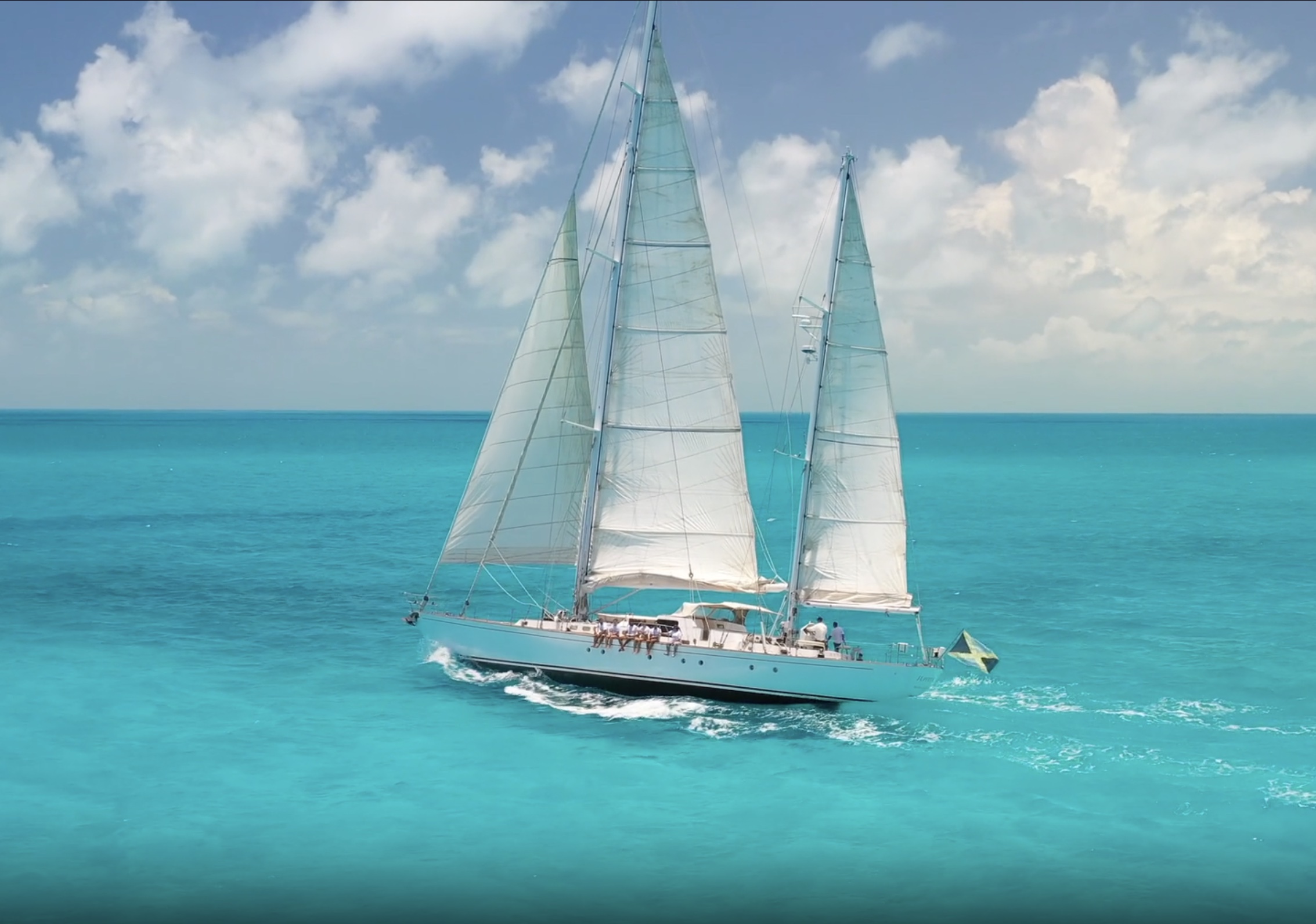
Wisdom
Jeffrey Wisdom, Captain Steven Greaves
Built by Cantiere Navale Ferri SRL in 1989, Wisdom is a 100’ sailboat owned by Jeffrey Wisdom. Wisdom spends the majority of her time in the Caribbean hosting young adults who are aging out of the foster care system on 80 day educational voyages. While at sea, Captain Steven Greaves ensures they practice Green Boating by using sail power rather than engine propulsion whenever possible. The crew has made efforts to minimize their ecological impact by choosing eco-friendly cleaning products, using a Cora Ball to remove microplastics from their laundry, and limiting use of single-use plastics onboard. The crew take their green practices off-boat as well, engaging in marine and terrestrial cleanups and planting trees. To broaden their impact, the crew educates their passengers about these sustainable practices and the importance of reducing our environmental footprint. The crew plans to increase the sustainability of the vessel within the year by installing solar panels and wind turbines to power her.
- Environmentally friendly cleaning products
- Dispose of waste properly
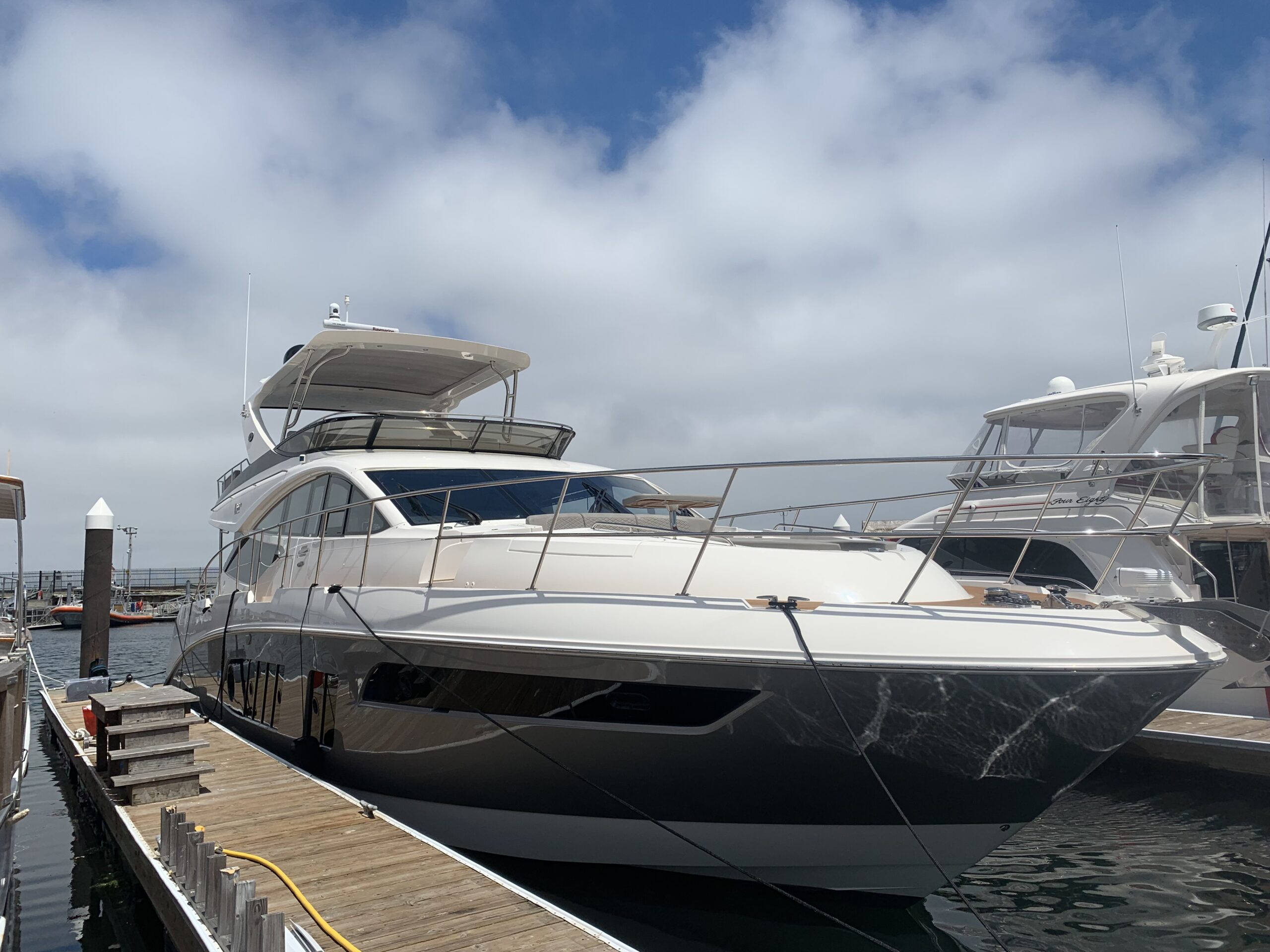
Valkyrie
Tom Peterson
DISCOVERY Yacht Valkyrie is a 65’ motor yacht built by Sea Ray, captained by Tom Peterson. Peterson’s actions onboard D/Y Valkyrie emphasize how Green Boating does not have to be complex, it can be as simple as finding sustainable alternatives in our daily routines. For Peterson, revolutionizing the way water is created and consumed onboard D/Y Valkyrie is a small, but important way that crew and guests participate in Green Boating. Instead of using plastic water bottles, drinking water is created using a reverse osmosis watermaker that desalinates ocean water for consumption. To make it even better, the galley sink runs this fresh water through a carbon filter to give it a more “sweet” taste. According to Peterson, guests “want their bottled water because they “perceive” that water in a bottle is fresher than anything they can get from a tap.” To combat this, D/Y Valkyrie bottles their water for guests in reusable plastic containers that replace single-use plastics, while appealing to the consumer.
- Avoid usage of single-use plastics
- Conserve water using a watermaker
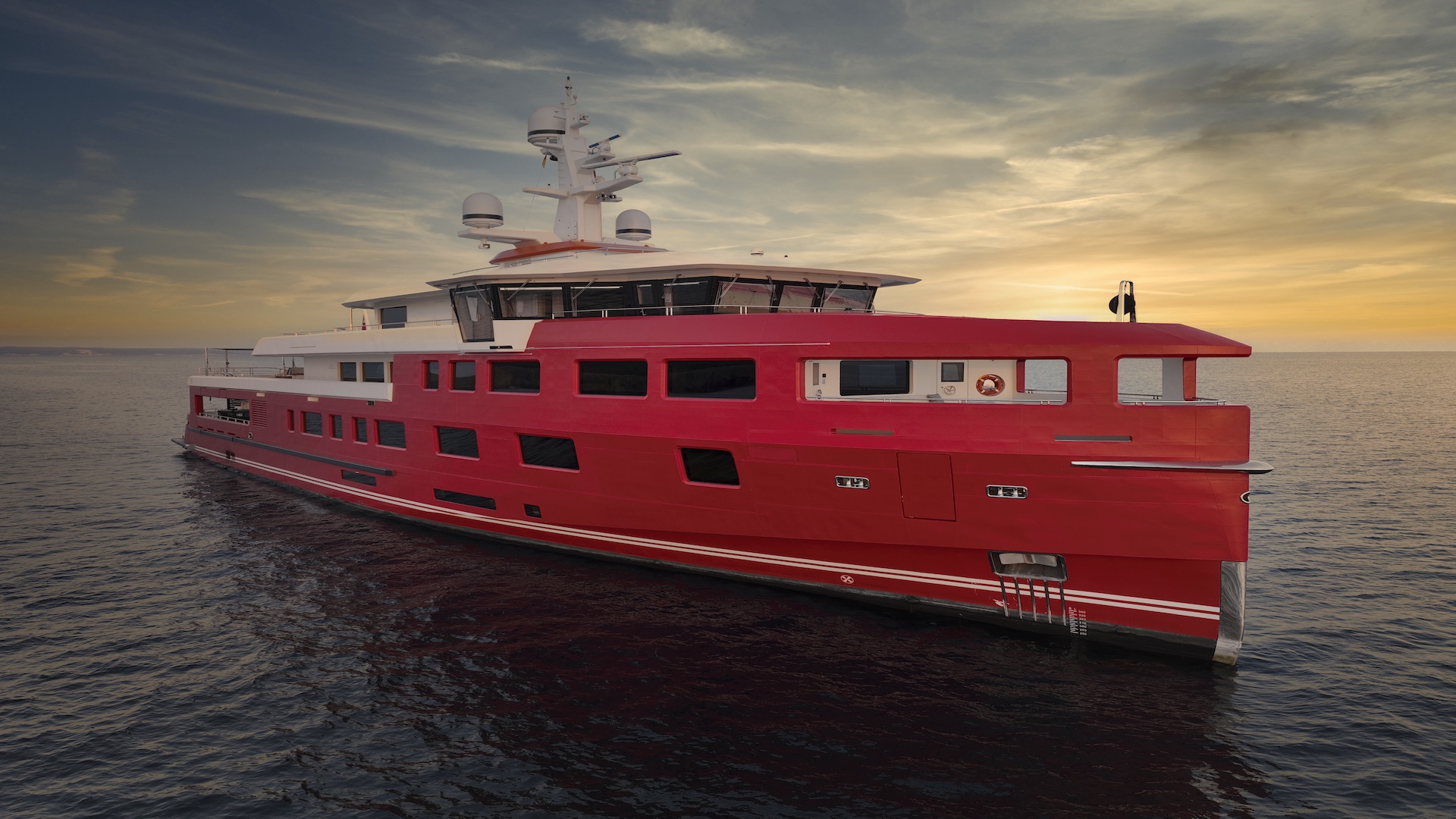
AKULA
Seaefe Ltd
DISCOVERY Yacht AKULA is a 195’ Motor Yacht built by Rossinavi Yachts in 2024. Owned by Seaefe Ltd, AKULA is a luxury expedition yacht built to withstand the extreme while being conscious of her environmental footprint. D/Y AKULA was designed with the health of our oceans in mind, built to be 95% recyclable with synthetic recyclable teak on all decks. D/Y AKULA limits her carbon footprint by relying on a diesel electric engine, which reduces her fuel consumption and emissions as well as noise pollution and vibrations which may disturb wildlife. D/Y AKULA is IMO Tier III and Marpol compliant, meaning she has been built to have low Nitrogen Oxide emissions, reducing her contributions to air pollution while on long voyages. Onboard, her crew uphold environmentally friendly standards by limiting waste and energy usage with advanced wastewater and recycling plants and a garbage freezer.
- Low emissions
- 95% recyclable build
- Low waste production onboard
